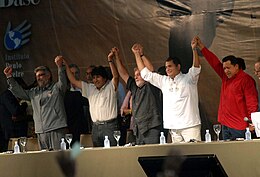
Back اشتراكية القرن الحادي والعشرين Arabic Socialismu del sieglu XXI AST Сацыялізм XXI стагоддзя Byelorussian Socialisme del segle XXI Catalan Socialismus 21. století Czech Sozialismus des 21. Jahrhunderts German Socialismo de la 21-a jarcento Esperanto Socialismo del siglo XXI Spanish XXI. mendeko sozialismo Basque Socialisme du XXIe siècle French

| Part of a series on |
| Socialism |
|---|
 |
| Part of a series on |
| Social democracy |
|---|
 |
Socialism of the 21st century (Spanish: Socialismo del siglo XXI; Portuguese: Socialismo do século XXI; German: Sozialismus des 21. Jahrhunderts) is an interpretation of socialist principles first advocated by German sociologist and political analyst Heinz Dieterich and taken up by a number of Latin American leaders. Dieterich argued in 1996 that both free-market industrial capitalism and 20th-century socialism have failed to solve urgent problems of humanity such as poverty, hunger, exploitation of labour, economic oppression, sexism, racism, the destruction of natural resources and the absence of true democracy.[1] Socialism of the 21st century has democratic socialist elements, but it also resembles Marxist revisionism.[2]
Leaders who have advocated for this form of socialism include Hugo Chávez of Venezuela, Rafael Correa of Ecuador, Evo Morales of Bolivia, Néstor Kirchner and Cristina Fernández de Kirchner of Argentina,[3] Luiz Inácio Lula da Silva of Brazil and Michelle Bachelet of Chile.[4] Because of the local unique historical conditions, socialism of the 21st century is often contrasted with previous applications of socialism in other countries, with a major difference being the effort towards a more effective economic planning process.[2] Outside Latin America, socialism of the 21st century has been promoted by left-wing leaders such as Mark Drakeford and Jeremy Corbyn in the United Kingdom[5][6][7] and Lothar Bisky, Egon Krenz and Oskar Lafontaine in Germany,[8][9] and also by parties such as the Communist Party of Spain[10] and United Left in Spain[11] and the Communist Party of the Russian Federation and Just Russia.[12]
- ^ Heinz Dieterich: Der Sozialismus des 21. Jahrhunderts – Wirtschaft, Gesellschaft und Demokratie nach dem globalen Kapitalismus, Einleitung
Socialism of the 21st Century – Economy, Society, and Democracy in the era of global Capitalism, Introduction. - ^ a b Burbach, Roger; Fox, Michael; Fuentes, Federico (2013). Latin America's Turbulent Transitions. London: Zed Books. ISBN 9781848135697.
- ^ Montañez, Julio Ramírez (27 June 2016). "The XXI century socialism in the context of the new Latin American left". Civilizar Ciencias Sociales y Humanas. 17 (33). Colombia: Universidad Pontificia Bolivariana: 97–112. doi:10.22518/16578953.902.
This socialism of the XXI century, overflowed the Venezuelan experience and became a trend that took greater force throughout Latin America, especially in Ecuador with its President Rafael Correa, in Bolivia implemented by its president Evo Morales and in Argentina initially with Néstor Kirchner and later with his wife Cristina Fernandez de Kirchner, as well as in Nicaragua, El Salvador, Uruguay. This ideological conception sought primarily to give responses to the serious problem of underdevelopment in which the region lives due to the social imbalances, injustice and inequality (Hamburger, 2014).
- ^ Partido dos Trabalhadores. Resoluções do 3º Congresso do PT (PDF). 3º Congresso do PT (in Brazilian Portuguese).
- ^ Wilkinson, Michael (28 September 2016). "Jeremy Corbyn pledges 'socialism for 21st century' as he plans business tax hike and benefits free-for-all". The Telegraph. Retrieved 1 November 2024.
- ^ "Labour must prepare for a 2017 general election, says Corbyn". Financial Times. 28 September 2016. Retrieved 1 November 2024.
- ^ Osborne, Rob (12 November 2018). "Mark Drakeford on drugs, the monarchy and his vision for Wales, as he launches his manifesto". ITV News. Retrieved 1 November 2024.
- ^ Herzinger, Richard (5 June 2007). "Eingemauert" [Walled in]. Jüdische Allgemeine (in German). Retrieved 1 November 2024.
- ^ "Linkspartei: Auf der Suche nach einem Grundsatzprogramm" [Left Party: In Search of a Policy Program] (in German). 19 March 2010. Retrieved 1 November 2024.
- ^ "Hay que emprender, como ya han hecho otros países, el camino del socialismo del", 14 de abril de 2009.
- ^ "Hemos decidido que queremos construir el socialismo del y, para ello, se necesita mucha movilización", Cayo Lara, coordinador general de IU, 14 de abril de 2009.
- ^ "Politics in Translation / A Fair and Just Russia, Part 2". Woodside, California, EUA: The School of Russian and Asian Studies. 12 August 2009. Archived from the original on 24 March 2014. Retrieved 24 March 2014.